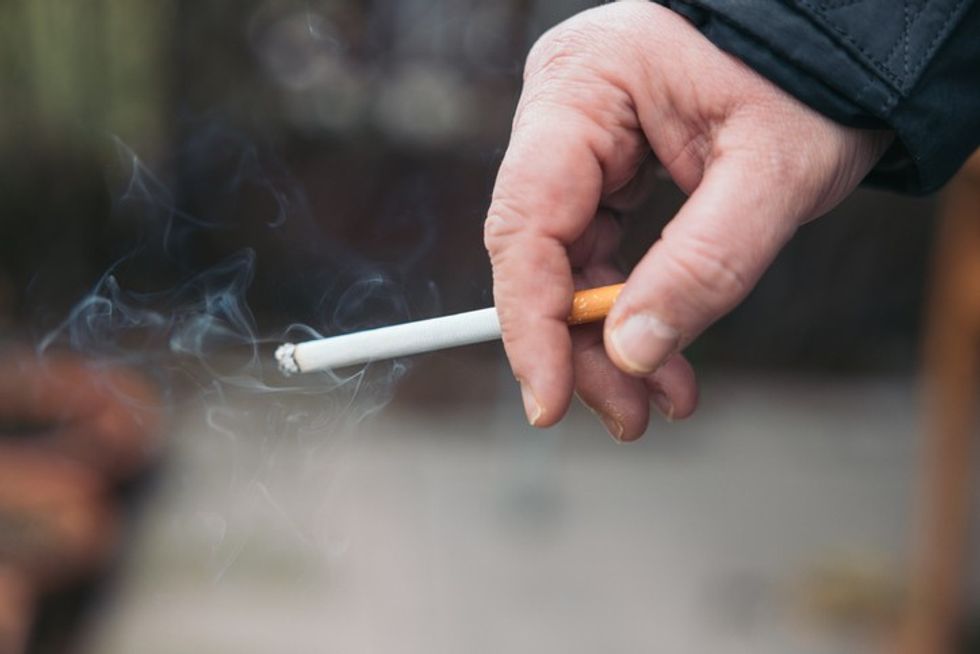Prime minister Rishi Sunak’s policy to introduce a phased generational smoking ban (if it comes into effect) will have profound consequences and long-term deep impact on retailers who will be piled with confusing legal hassles, Asian Trader has learnt. While the responsibility of the ban’s implementation will seemingly fall on retailers, the tobacco market on the other hand is also feared to further fall into the hands of organised criminal gangs.
Under the Tobacco and Vapes Bill introduced on March 20, children turning 15 this year or younger will never legally be sold tobacco. The government states that this policy will ensure that future generations are protected from the harmful impacts of smoking and thus saving thousands of lives as well as billions of NHS’ pounds.
Superficially, the bill sounds like a simple plan, but it has confusing layers. It is feared that it will prove to be a challenge to implement by convenience stores, otherwise whose major share of footfall and sales come from this product line.
Under this plan, anyone born on or after Jan 1 2009 will never legally be able to buy tobacco. This means that after Jan 1 2027, the minimum legal age of buying buy tobacco will change to 19-years’ old (on or after 1 January 2028); 20-years’ old (on or after 1 January 2029); 21-years’ old (on or after 1 January 2030) and so on, with the minimum age increasing with every passing year until it applies to the whole population.
Sound confusing? If not, then picture a time few years down the line when a retailer and his staff will be held responsible if he is not able to prohibit sales to 36-year-olds while granting the same to 37-year-olds.
Tobacco Manufacturers' Association (TMA) has labeled generational smoking ban as “unworkable, illiberal and unenforceable”.
In response to the publication of the Tobacco & Vapes Bill, Rupert Lewis, Director of the TMA, said, “Sunak’s policy to introduce a phased generational smoking ban will have profound consequences for consumers, retailers and local communities across the UK”.
Leading tobacco company JTI UK has also expressed extreme disappointment over the Tobacco and Vapes Bill.
Sarah Connor, Communications Director at JTI UK, told Asian Trader, “We are disappointed by the proposals made in the Tobacco and Vapes Bill. A generational ban takes away the right of adult consumers to make their own choices solely based on their year of birth and sets a worrying precedent for this type of discriminatory approach to other products.

“JTI is committed to the concept of informed choice across the spectrum of conventional tobacco products and alternative nicotine products such as vaping products, heated tobacco products and nicotine pouches. Providing adult consumers with a choice of products, including those that have the potential to reduce the risks associated with smoking, is surely a more rational approach than an unproven concept of a generational ban.”
Connor further added that similar proposals were considered but discontinued in Singapore, which has chosen to await more evidence, and Malaysia, which has concluded that it would be unconstitutional.
In New Zealand, which passed a similar law earlier in 2023, the new Government will now repeal the policy before its implementation.
The bill also talks about introducing new powers to restrict vape flavours and packaging as well as their placement in the stores. Additionally and separately, the government is committed to outrightly ban the sale and supply of disposable vapes from April 2025. But that’s a discussion for another day.
Impact on Retailers
Under the bill, enforcement officers’ powers will also be strengthened with ‘on the spot fines’ of £100 to uphold the new laws. This builds on a maximum £2,500 fine that local authorities can already impose.
Clearly, the onus of making the UK “smokefree” seems to be falling entirely and solely on the shoulders of retailers.
Every year, the ‘proof of age’ requirements will change and the only way for retailers to ensure that they are not breaking the law will be to check and scrutinise the photographic ID card with every purchase, keeping in mind the year factor.
A situation like this presents a perfect ground for conflict for retailers who are otherwise already reeling under record crime rates and abuse levels, as reflected by wider industry reports.
The British Retail Consortium’s most recent annual Crime Survey, published in February 2024, found that UK retailers now suffer more than 1,300 incidents of violence and verbal abuse every day – compared to 870 incidents recorded last year and a huge 180 per cent increase from 450 incidents a day in 2019-20.
The Scottish Grocers’ Federation reported that “over half of reported daily incidents of abuse against staff were connected to refusing a sale or when asking for proof of age”.
The 2024 Crime Report by Association of Convenience Stores (ACS), released in early March revealed that an overwhelming majority (87 per cent) of people working in convenience stores have faced verbal abuse over the last year. The same report ranked "enforcing the law on age restricted sales” as top triggers for abuse. Sadly, the reality is that overstretched police force is somewhere seems to be failing to combat retail crime.
A generational smoking ban will further require retailers to decline sales to fully-grown adults (who can otherwise buy alcohol!) who cannot present satisfactory photographic ID.

Slamming the bill, Lewis from TMA sais, “Fast forward a few years and a phased generational smoking ban will see retailers having to differentiate between 28-year-olds and 29-year-olds when selling tobacco. This is not common sense!
“The introduction of a phased generational ban will lead to an escalation in more threatening anti-social behaviour towards retailers, as the weight of responsibility for enforcement will fall entirely on the shoulders of shopkeepers and their staff.
“The New Zealand government has seen sense and repealed a ‘generational ban’ before it was implemented, and the UK government would be wise to adopt a similar approach, because the repercussions of introducing a ‘tobacco prohibition law’ will be long-lasting and felt by communities across the UK for years to come,” he told Asian Trader.
Elaborating on the impact, Connor from JTI called the proposed generational ban “a deeply impractical law for retailers”.
“This will mean that by 2037, 28-year-oldswon’t be able to buy tobacco products, but 29-year-olds will. Retailers will be expected to distinguish this difference in age when deciding whom to sell tobacco products to,” she told Asian Trader.
Referring to asking ID for age verification as leading common triggers for abuse, Connor added, “Having spoken to retailers, we know that many are worried that the proposed ban would lead to an increase in threatening or violent behaviour towards them.”
A JTI survey found that 55 per cent of retailers are worried that the proposed changes will make ID checks more complicated for their staff, with 58 per cent stating it will impact staff training specifically around underage sales.
Illegal Trade
A major yet obvious repercussion clear in sight here is the rise in illegal trade and underground market.
JTI’s survey also supports this view.
Connor told Asian Trader, “Over two-thirds (67 per cent) of the retailers told us that the generational tobacco ban would likely lead to an increase in illicit tobacco activity, and there is concern within the industry that illegal products will become more prevalent, damaging sales for the majority of hard-working retailers."
TMA also points out that prohibition of legal products always has dangerous side effects and opens the door to criminal gangs to sell illegal products, as was seen in South Africa in 2020, following a temporary ban on tobacco products during the COVID lockdown.
Criminals were ready to fill the gap, and 93 per cent of smokers in South Africa bought tobacco from criminals through the lockdown.
Lewis from TMA stated, “As a policy, it is unworkable, illiberal and unenforceable, and risks pushing an even larger share of the UK’s tobacco market underground – with every passing year – into the hands of the organised crime gangs that spread violence and disorder up and down our country.”
Noteworthy here is that illegal trade of cigarettes and tobacco products is not new in the country. The trade, its logistics and supply chain exist and is flourishing already, as reflected by regular media and councils’ reports. Such a ban will only further boost underground trade.
Smuggled tobacco already costs law-abiding retailers thousands of pounds as smokers switch to cheaper, un-taxed and un-regulated illegal products, pointed out TMA. A generational ban will hand more and more of the UK tobacco market to criminals every year.
To smoke or not to smoke
This proposed generational smoking ban is now a burning political issue and seems to be dividing Tories.
Greg Smith, a Tory backbencher, said the extra powers for councils to issue fines risk irking core small businesses.
“I would anticipate there will be a significant bite-back. There could be upwards of 80 MPs on the Conservative benches opposing this.”
If a Tory rebellion grows, the bill may rely on support from Labour to pass. Labour, on the other hand, is calling Sunak’s generational ban “a gimmick”.
“No thought appears to have been given to the pressure this places on retailers, who will be asked to determine not whether someone is an adult, but whether they were born after 2009, a moving target as time goes on,” states Labour.
Democratic Unionist Party MP Ian Paisley Jr, also the Vice Chair of the All-Party Parliamentary Group for Retail Crime, Safe and Sustainable High Streets, feels that generational ban will put shopkeepers at risk.
Tobacco makers, meanwhile, are calling on retailers to raise their voice while there is still time.
Lewis said, “As the bill is debated in Parliament, there is still time for retailers to take action and ensure their voices are heard. The best way to do this is for retailers to contact their local MP to express any concerns they may have around the bill. Whilst this isn’t impacting them directly today, the proposed ban will have serious repercussions in the years to come, so it is incredibly important retailers have their say now and speak to their local MP.”
Retailers can easily find their MP using the ‘Find Your MP’ site and can share an email or letter expressing their opinions directly.
There are plenty of laws today that can be used to restrict access to tobacco and other nicotine products by youth. All seem to be characterised by lack of enforcement. It will surely not help to pile the legislation with this recent phased generational ban on tobacco, a confusing policy that is expected to impact retailers badly.






